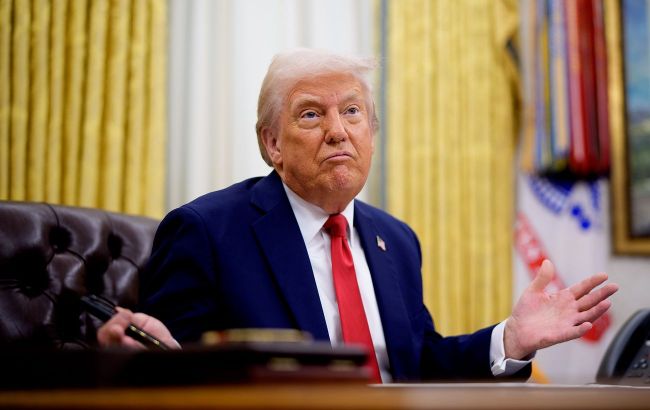Economy, weapons, and Trump: How Israel-Iran conflict could hit Ukraine
 US President Donald Trump (photo: Getty Imahes)
US President Donald Trump (photo: Getty Imahes)
The current escalation of the conflict between Israel and Iran could have global consequences, including for Ukraine.
RBC-Ukraine explains how events in the Middle East could affect the Russian-Ukrainian war in economic, military, political, and informational terms.
The confrontation between Iran and Israel, on the one hand, and the Russian-Ukrainian war, on the other, is closely linked not only because Iran is actively helping Moscow. More importantly, they are closely linked in the mind of US President Donald Trump.
A few months ago, RBC-Ukraine heard from interlocutors in the Ukrainian leadership that the White House firmly links the end of the Russian-Ukrainian war with the resolution of the Iranian problem — and such a package is, of course, disadvantageous for Ukraine, because it involves some concessions on our part.
In early June, Trump himself publicly confirmed this. In his report on his conversation with Vladimir Putin on his Truth Social page, the American president, mentioning the war in Ukraine, immediately moved on to the topic of Iran. "President Putin suggested that he will participate in the discussions with Iran and that he could, perhaps, be helpful in getting this brought to a rapid conclusion," Trump wrote.
Thus, the White House owner directly acknowledged that Putin wants to sell him his influence in Tehran. And demand some concessions on the Ukrainian front in return.
The extent to which the current escalation in the Middle East will affect the situation in Ukraine depends primarily on the scale of this escalation. If Iran's response is fairly modest and the conflict does not escalate further, there will be no significant consequences. But given the scale and effectiveness of Israel's operation, this scenario seems unlikely.
Therefore, even if it does not ultimately end in a major war in the Middle East involving many participants (such a scenario is also unlikely), the exchange of blows between Iran and Israel may continue for a long time. Israeli Prime Minister Benjamin Netanyahu has already warned that this will certainly be the case.
Economic impact
The most tangible result of the attack on Iran, which is already being felt, is a sharp jump in world oil prices. For Ukraine, this is, of course, bad news.
Recently, Russia has had major problems filling its budget due to falling oil and gas revenues. The expected sanctions from the European Union or even the entire G7 could further undermine Russia's ability to wage a long war. Now, however, there is a risk that the situation will turn around. It all depends on how stable the price increase will be. Whether Iran will deliberately exacerbate the situation on the oil market, disrupting oil supplies from the Persian Gulf through the Strait of Hormuz.
Military impact
In military terms, Iran and Russia have long been close partners. Unfortunately, however, it is unlikely that Iran's current problems will seriously undermine Russia's offensive capabilities. The aggressors have long mastered the technology for producing Shaheds, and what is more, they are successfully scaling up production at home and are unlikely to be heavily dependent on Iranian supplies, if at all.
In the opposite direction — from Russia to Iran — some air defense systems may well arrive (the scale of Iran's air defense losses after the Israeli attack is not yet fully understood, but they are significant). However, it is unlikely that Russia, which is itself under constant attack from Ukraine, will seriously weaken its air defense to help its ally.
What will hurt Ukraine is that the Americans will now be forced to provide more active assistance to Israel. Unfortunately, this could be detrimental to Ukraine. Ukrainian President Volodymyr Zelenskyy stated a few days ago, even before the Israeli attack, that such a problem exists. "We counted on this project. 20,000, between us, 20,000 missiles, anti-Shahed missiles. It wasn't expensive, but it's special technology. So, we counted on these 20,000 missiles. Today in the morning, my Minister of Defense told me that the United States has moved it to the Middle East," Zelenskyy said in an interview with ABC News.
These 20,000 were intended for the US military in the region, but in the current situation, large deliveries directly to Israel are also possible. After all, one of Iran's main tools in the war with Israel is the very same Shahed drones that they launched this morning.
Political impact
But the most important factor will be the political aspect, namely, Donald Trump's interpretation of what is happening. On the one hand, he may conclude that Putin has not fulfilled his promises and has failed to pacify the Iranians, given that they have been so intransigent in the negotiations of recent weeks and Israel has had to resort to extreme measures.
On the other hand, if the conflict escalates, the Kremlin will have even more opportunities to sell its influence on Tehran. After all, Trump came to power with promises to end wars, but in fact, they have not only not ended, but have only gained momentum.
Then Trump will have two possible strategies. Either he will continue to try to negotiate, in particular with Moscow, or through Moscow. Or, on the contrary, he will take a much tougher stance in the confrontation with the entire global axis of evil led by Russia — something that Ukraine and Europe have been pushing him to do for so long.
 Vladimir Putin and Iran's Supreme Leader Ali Khamenei (photo: Getty Images)
Vladimir Putin and Iran's Supreme Leader Ali Khamenei (photo: Getty Images)
Finally, Trump may decide that Russia and Putin have nothing to do with what is happening in the Middle East, that it is only a matter for Iran, Israel, and the US itself.
And there are already some signs that Trump has chosen this third path. At least, his latest post on Truth Social on this topic contains no references to Russia at all. On the contrary, the American president publicly positions Israel's attack as a harsh means of coercing Iran into an agreement, something that Russia has nothing to do with.
Informational impact
In purely informational terms, events in the Middle East have certainly pushed the topic of the Russian-Ukrainian war down the global agenda. And if the escalation continues, the situation will probably remain so for some time.
However, it is unlikely that the world will forget about the Russian-Ukrainian war because of the Iranian-Israeli conflict. At least after previous escalations in the region — the Hamas terrorist attacks on Israel or the start of the Israeli operation in the Gaza Strip — this did not happen.
Russian aggression against Ukraine has long since become too global and important a story, with a huge impact on Europe and the whole world, so it will certainly not be possible to push it out of the public eye. But Donald Trump himself may indeed switch his attention completely to ending the new war for a while.

